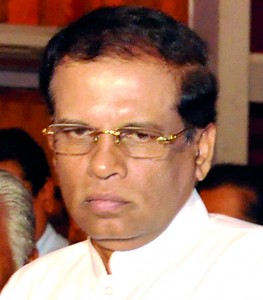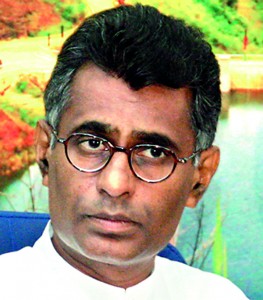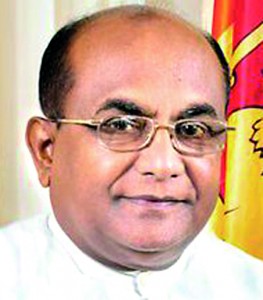News
Don’t hold your breath, Ministerial resolutions for 2013
View(s):Await five-year plan says Minister
By Damith Wickremasekara
An industrial zone to produce pharmaceuticals, a Board to maintain standards of medicines and fully implementing the gazette regulation on making it compulsory to display prices of drugs are some of the priorities of the Health Ministry for 2013.
Health Minister Maithripala Sirisena told the Sunday Times he hopes to put into effect a five-year plan covering 24 divisions in the Health sector.

Health Ministry - Maithripala Sirisena
He said strengthening the immunisation programmes, construction of buildings required for the Health sector, recruitment of staff, improving laboratory services and reduction of communicable and non-communicable diseases are among other priorities.
He said, this year, at least 75% of the hospitals have new buildings coming up or buildings proposed to be constructed, while some constructions have already been completed. “A five-storied hospital building put up for the Jaffna hospital will be opened by President Mahinda Rajapaksa on January 15,” he added.
Mr. Sirisena said a building constructed with aid from The Netherlands in Nuwara Eliya will be opened on January 20, while other new hospitals in Hambantota, Galgamuwa, Warakapola, Teldeniya and another in the north were scheduled to be opened this year too.
He said to overcome the shortage of nurses and to improve their training, a university will be set up to award degrees for nurses this year, while some 5,000 nurses will be recruited.
“We will also be effecting internal transfers of the administrative staff, as such transfers have not been carried out for 10 to 15 years. Staying in one office could lead to corruption. I will appoint a Committee to implement a transfer policy,” he said.
He said a campaign will also be carried out under the theme of ‘a society free of alcohol’, to educate the people on the dangers of alcohol consumption.
Mr. Sirisena said that it was an unfortunate situation that cases of sexual harassment were reported from the Health sector, and in view of the complaints received, a team of officials have already been appointed to look into such allegations.
‘During this year, strict disciplinary action will be taken in such cases. This would include handing over suspects to the police, directing complaints to the Children and Women bureau, and filing cases against them. During this year, we will take steps to prevent such abuse in the Health sector,” he added.
100% electrification of country in new year
Power and Energy Minister Champika Ranawaka said 100% electrification of the country would be given top priority in the new year.
“About 94% electrification has been done. We could have achieved 100% this year, if not for the sanctions imposed on Iran, which in turn affected some 1,000 rural electrification projects,” Mr. Ranawaka told the Sunday Times.“Currently, though electricity is available, there may be other reasons for persons not obtaining electrical connections. Even in Colombo, some persons have not obtained connections,” he said.
Completion of the second phase of the Lakvijaya plant in Puttalam, which could provide 600 MW, is due later this year, while its third phase is due to be completed by next year.

Power and Enery Ministry - Champika Ranawaka
“Energy diversification is the next step forward. We have hydro, thermal, coal, solar and wind power, and hope to introduce gas as well. Diversification is done to stabilise the whole situation. In India, there are machines, but no coal or gas sometimes,” he said.
“It is difficult to make forecasts in the energy sector. Last year was the worst year in hydropower generation. Usually, it is over 30%, but last year it dropped to about 15%.
“Though the Agricultural sector was affected, the Industrial and Service sector did not have negative growth. As a country, we have shown progress. It showed that despite adverse situations and extreme weather, we have done well. We should expect more extreme weather situations where there will be droughts and floods this year, and should be prepared for this. Plans are afoot in preparing for this one,” he added.
Mr. Ranawaka said that System modernisation is another area they are focusing on to reduce transmission losses.
“We also plan to further improve on the Smart Grid system where your electrical appliances can be controlled by your mobile phone, when you are away from home. This can be used to switch off lights, control air conditioners etc.
“The Ceylon Electricity Board (CEB) has been projected as a loss-making institution, but the reality is that, it is due to the government’s policy of annually subsidizing for Rs. 62 billion, out of which, Rs 32 billion is for households and a similar amount for industries,” he said.
‘The CEB’s problem is that the input costs are determined by outside forces such as fuel and coal prices, while tariffs are controlled by the Public Utilities Commission of Sri Lanka and the Finance Ministry. The CEB cannot make its own decisions’.
Agriculture ministry gets down to earth
By Hansani Bandara
Paying special attention to climatic changes and taking precautions accordingly to minimise their effects on crops, will be the top priority for the Agriculture Ministry this year.

Mahinda Yapa Abeywardena - Agriculture Ministry
Despite calamities due to climatic changes last year, Sri Lanka’s Agriculture industry is geared and ready to face the challenges in the new year, as the Ministry of Agriculture plans to proceed with its road map for 2013, Agriculture Minister, Mahinda Yapa Abeywardena told the Sunday Times.
He said since the country was affected by climatic changes on two occasions last year, due to the drought and the heavy flooding, food production was at a standstill in the areas affected by these conditions.
“As a resolution to the issue, following research conducted, we have been able to introduce a strain of seed paddy that matures in a very short period of 75 days,” he said.
Adding that storage units need to be constructed to facilitate the storage of these while preserving their ability to germinate, he said that the ministry has already proposed to the government with regard to the commencement of these projects, where seed paddy will be stored for a period of two years under controlled temperature and environmental conditions, will be facilitated.
“To achieve qualitative production, provision of quality seeds to farmers should be done, and under one of our main plans for this year, a special program will be implemented to cultivate and provide quality seeds. The ministry also hopes to provide technical and financial assistance to farmers who cultivate seeds in their own farms,” he said.
Explaining the ministry’s policy with regard to hybrid seeds, he said although earlier it was the policy of the ministry not to encourage the use of imported hybrid seeds, this year the ministry will take measures to cultivate hybrid seeds locally, since the use of hybrid seeds deliver more commercial benefits than the use of locally produced seeds.
“It is true that locally produced seeds are of a higher quality than imported hybrid seeds, but require a greater effort and manpower to cultivate and harvest, where as hybrid seeds are much easier to cultivate. As farmers are only concerned with commercial benefits, the ministry has no option but to approve the use of hybrid seeds, but we hope to produce them locally, so that the qualitative aspect could also be looked into,” he said.
“To reduce the usage of chemical fertiliser, the Ministry has introduced a programme where we promote and encourage the use of organic fertiliser. The President has promised to pay Rs. 40 as an incentive under the budget for rice produced using organic fertiliser this year. We also educate farmers on the use of organic fertilizer. We hope to gradually discourage the use of chemical fertiliser, but this can not be done at once since it will affect the production where it could even be reduced to 50 per cent,” he said.
Follow @timesonlinelk
comments powered by Disqus



















